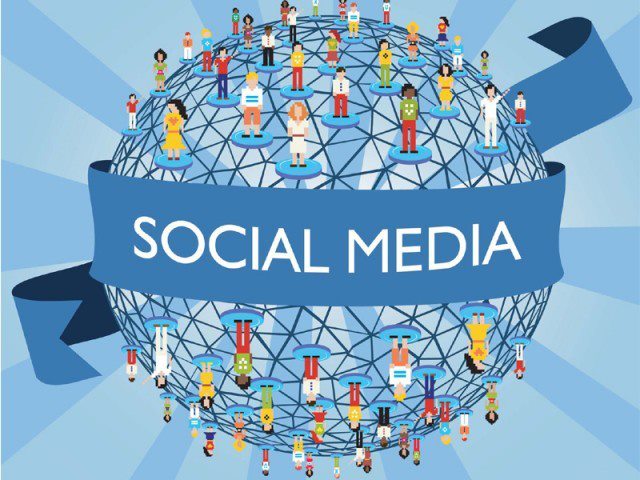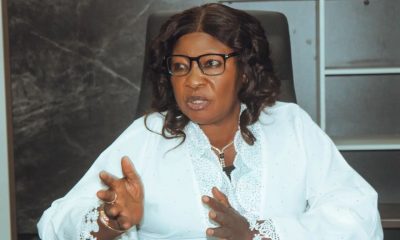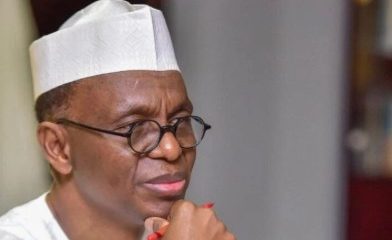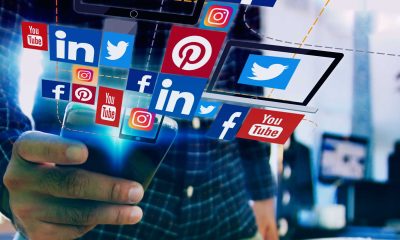Featured
Power Shifts; Big Tech Losing
Published
5 years agoon
By
Editor
Free speech that empowers citizens in this space age now bears a price tag as leaders across the free world pull out all the stops to snatch the freedom back
By Elijah Olusegun
With about half of the seven billion people of the world on Facebook, Instagram and WhatsApp—and 340 million on Twitter—and 1.3 billion on You Tube—and the combined net worth of the three testing $500 billion—the nerdy founders of the social media giants suddenly have powers—financial and social—thrust on them.
But the powers, in over a decade of social media disruption, have been deployed to all sorts of commercial and political abuse. Facebook’s complicity in Cambridge Analytica’s invasion of privacy and manipulation, Russian intrusion into the 2016 US election, and other misuse have touched governments around the world in the raw. And the delusion of invincibility that internet enthusiasts have about Facebook, You Tube, Twitter, and free speech is unravelling now.
With Germany’s Facebook Act, the US imminent “Section 230” repeal, the UK coming policies, Australia’s similar Act, the ice is already broken. Nigeria may soon join. And when all is done and dusted, the power at the fingertips of about five billion worldlings will slip off—flowing back into the grip of governments that still claim power belongs to the people. For now, citizens are no longer free to insult German public office on Facebook.
The social media platform founders might not have seen this sledge hammer coming—in a liberalized world the Internet has shrunk to a global village. Nor their business forecasts could have figured out the terabytes of influence surging within their platforms’ algorithms.
From their incubators in California in early 2000s, Facebook’s Mark Zuckerberg, Twitter’s Jack Dorsey, and Google’s Larry Page and Sergey Brin wouldn’t have had the remotest idea they would do these earth-shattering exploits their platforms facilitate today: from swaying elections in the US (2015), Nigeria (2014), and other nations around the world, and disrupting traditional newsgathering, making every user a publisher, through to ruffling democracies, and taking down autocratic governments or any unpopular government for that matter.
Democracy now becomes participatory, fully. The governed can put in their oars, even in matters way above their heads, in government affairs, and mix it with their representatives. No more stove-piping.
US President Donald Trump exemplifies this so-called equality like no other. From his declaration of candidacy mid-2015 to the first two and half years of his government, Trump tweeted 17,000 times, to his 77 million-strong MAGA crowd (as Factbase puts it), and White House officials. Likewise outside of the US.
His reach goes particularly deep into Nigeria. At least, no fewer than 70,000 Nigerians follow him on Twitter. If anything, the number reveals the social media crowd in love with slap-bang politics in Nigeria.
According to NOIPOLL’s 2019 figures, 39.6 million Nigerians are on Twitter alone. “Interestingly, a higher proportion (29 percent) of Twitter users acknowledged that giving voice to many voiceless Nigerians is the greatest impact Twitter has made in Nigeria,” the pollster said.
To many global rights thinkers, a social media account is a right—some kind of empowerment. According to Media Governance, platform users are considered to own right to exist as equals. In that sense, President Muhammadu Buhari and a bellhop are now kind of equal on Twitter the leveler. They both have information to share—and information is power thanks to ICT.
And that information power, rights activists, platform owners, and freedom fighters insist, is inalienable, no matter its nature—as in disinformation; or its consequences.
Which is why You Tube and Twitter won’t bat an eyelid when the bellhop—or a Nnamdi Kanu, the leader of the outlawed IPOB—broadcasts a video on Twitter claiming President Buhari died in 2016, and his biological double, brought in from Sudan, has been at the helm at Aso Rock.
In spite of the content’s hate, disinformation, and injury—it’s still free speech. And more so if it happens in Nigeria and other third-world countries whose masses of poor people get grants and handouts from the megatech.
While the fallout of such misinformation shrouded in free speech wreaks havoc, many of the advocates will still blink over the cause, and condemn the effect.
The October 20 violence between state’s forces and anti-police brutality protesters in Lagos, Abuja, Rivers, and other states spiraled into violence ended up in 69 deaths, according to Buhari. No fewer than 205 police stations torched, 71 public warehouses and 248 private stores looted in the heat of the violence. “Social media was used to guide arsonists and looters to certain properties, both public and private, during the #EndSARS violence,” Information Minister Lai Mohammed told online publishers November 1.
An eagerbeaver in the ruling APC sued Twitter later in October, after his initial warning to the platform had no impact. Adam Garba then slammed Dorsey with a $1 billion suit, before an Abuja high court, for raising fund in support of the ENDSARS protest. Garba move was unpopular. “We’ve decided to join S/N: FHC/ABJ/CS/1391/2020 filed by APC member seeking to shut down Twitter because of #EndSARS protests,” said the Socio-Economic Rights and Accountability Project (SERAP) on October 20. “We’ll challenge this suit, defend free speech & access to information of everyone.”
But in Germany, for instance, crass, liable mischief any user posts online has ceased to be free speech. It must be published at a cost. Facebook, Twitter, and You Tube know it well. They must now take responsibility—or be damned.
With the Network Enforcement Act (aka Facebook Act) enacted in 2018, Germany now regulates social media contents. The six sections of the Act lay out the process of complaining, receiving complaints, responding, legal dispute, and fines. In summary, failure of a social media owner to delete an illegal post within 24 hours attracts a sanction: up to €50 million. A liable individual could cough up €5 million.
While that is fine for platform owners, users are not exempted. Germany just firmed up the online hate speech law in June. Social media platforms are now expected to capture such contents, and forward to federal police. All that for the purpose of clipping Germany’s wingnuts taking over the Internet.
It’s a little tricky in the US, the cradle of the Internet and its Big Tech. But the wide influence, politics, and monopoly of the social media platforms are not lost on either Democrats or Republicans. In the run-up to the Nov. 3 election, Trump went bonkers when his fave Twitter started labelling his unsubstantiated tweets about covid-19, mail-in ballot fraud. “A small handful of powerful social media monopolies control the vast portion of all private and public communications in the United States,” Trump said in his office on May 28 while signing an executive order to weaken Twitter, Facebook, You-Tube and others. He noted it was all about defending free speech “from one of the gravest danger it has faced in American history”. The Federal Trade Commission is already preparing a possible lawsuit against Facebook over unspecified antitrust violations.
American media believe Trump is a narcissist. So the executive order was one of his tantrums. But the incoming president, ex-V.P Joe Biden, 78, should be a grown-up. He was even more familiar with them when his former boss Barrack Obama brought the Silicon Valley into the Oval Office during his administration. Biden’s body language, however, now says he, too, like Trump, has an axe to grind with the big tech.
The president-elect actually has a chip on his shoulder. In the run-up to the election, his view on transgender was distorted on social media, and the owners let the disinformation fester. Such abuse of platform must be checked. And he never hid his disgust while campaigning. “The Biden Administration will shine a light on the online harassment, stalking, and abuse that now is a too-frequent reality for Americans, particularly for young people and women,” Biden’s website says.
That the two American parties have problem with the big tech only stimulated the politics. Facebook, the Biden campaign already believed, was siding with the right—because Zuckerberg said he was no arbiter of truth and would not take down Trump’s false posts and MAGA fake news. But he suddenly turned around when the scale apparently seemed tipping in favour of Biden as the election approached.
Biden eventually won. For the social media owners, it would have mattered little if he had lost. Certainly, whenever the chips fall where they may in America, something must give, as far as kneecapping social media goes. And that’s section 230 of the FCC, which shields interactive online platforms from liabilities. Trump described it as ‘a liability shielding gift’ from the U.S. to Big Tech. “It is a serious threat to our National Security & Election Integrity. Our Country can never be safe & secure if we allow it to stand,” Trump, still testing the section, tweeted Dec 1.
Biden, too, will surely tweak it by 2021. And the US will join Germany as one more free-speech democracy that is doing a double-take.
The UK is already there in the club of democracies limiting their citizens’ power. After its Online Harm consultation it carried out in 2019, Oxcom, the British communications regulator, started paying good attention to social media. The regulator will ply whatever policies the UK government makes very soon about it. Thirteen such policies the country made in the past failed because they were self-regulatory. Statutory ones are in the works.
In Australia, the die is cast. Its government passed its own Sharing of Abhorrent Violent Material Act in April 2019. The target are the platform owners—to make them liable for what they deem free speech on their platform. The punishment ranges from criminal penalties for social media companies, possible jail sentences for tech executives for up to three years and financial penalties worth up to 10 percent of a company’s global turnover.
Nigeria efforts to exert some checks r on social media have made a stride couple of tortured stride towards legislation. The Prohibition from Internet Falsehood and Manipulation Bill which Sen. Sani Musa (Niger-APC) sponsored passed the second reading in the Senate sometime in 2019. In its first coming four years earlier, the bill came as a proposal for an Act to Prohibit Frivolous Petitions and other Matters Connected therewith”. Senator Bala Ibn Na’Allah sponsored it then. The bill was to compel social media critics who love to dish dirt to accompany their petitions with sworn court affidavit, or face six months imprisonment upon conviction. But it ended up a stillbirth, after it passed the second reading. In fact, Buhari wouldn’t touch it with a long stick.
By last November when Sen. Musa palmed the bill off again, the fine, for citizens found guilty, was trimmed to N150,000 or three months in jail. Big Tech which refuses to address any such complaints will pay between N5 million and N10 million if a court finds it guilty.
“Íf countries like Philippines, Singapore, Italy, Malaysia, Australia, France, Indonesia, Egypt are putting control to prevent the spread of false information, what stops us from doing it?” he said.
As expected, Internet freedom activists, rights lawyers, and opposition resisted it. And the bill was stepped back down—until March. In the throes of the Covid-19 pandemic and disinformation that worsened its virality, Nigerians were pricked again with the Musa bill. A public hearing followed. Ministries, department, and agencies, including the NCC, BON, and others kicked against the bill. Likewise the unbending critics of the bill in the civil society organisations. Their grouse: existing laws—like the Cybercrime Act (2015) and defamation law—have covered the provision of the social media bill. And the punishment is stringent: three years in jail or a fine of between N7 million and N 5 million. Lagos lawyer Femi Falana believes with the provisions of the cybercrime law, there’s no use for another social media law. “What is required is the political determination to deal with the crime, without fear or favour,” he wrote in an article published Sept. 3 in 2017.
But the countries Musa listed as already regulating social media have those pre-existing laws, too.
Since 2006, Germany has been toughening its own cybercrime law which legal experts say is wide-ranging, needing a degree of expertise to keep track of its provisions. Then it added the social media legislation in 2018.
Freedom activists and rights organizations didn’t take it sitting down. “It is vague, overbroad, and turns private companies into overzealous censors to avoid steep fines, leaving users with no judicial oversight or right to appeal,” said Wenzel Michalski, country director at Human Rights Watch, Germany. Apart from the Christian Democratic Union (CDU), no other political parties in the parliament supported the law. The UN also flawed it.
Chancellor Angela Merkel and her CDU, however, stand their ground, insisting “it’s a correct and important step”. They all admit it needs improvement, though.
Maybe regulating social media has come to stay, but it is work in progress. It’s a fact rights defenders and freedom enthusiasts in Nigeria are straining to accept. The US, Germany, the UK, others who police the world for rights abuse are not interested in the debate in Nigeria. No one is wielding any cudgel either. Lai Mohammed has been referring to the deafening international silence on it. The only din now is that of NGOs.
SERAP is among the leading CSOs battling the passage of the social media bill in Nigeria. It has hired Falana to battle Nigeria in the Twitter/ENDSARS case the APC stalwart filed. The Lagos-based NGO has also threatened to go to court if the social media bill becomes a law. “The authorities should rather focus on ensuring company transparency & remediation,” it tweeted. SERAP didn’t respond to questions sent on the tweet and the international drift against online free speech.
Other critics have pointed out the importance of Nigeria criminal justice capabilities, too. What, however, looks more important to the Nigerian Senate and the sponsor of the bill is unity. “There has never been a time when Nigeria has been very fragile in terms of its unity than this period,” Musa said.
And when the October 20 ENDSARS protest rocked the nation to its foundation thanks to fake news and disinformation, passing the bill became more urgent. At least, the executive feels so. “Call it regulation or whatever, we have to do something most urgently,’’ the information minister said.
The point, now, is not whether Nigeria will make the social media bill a law. When?—is the moot question. It took Germany, now the poster boy for pricing free speech, about a year; the US, the world’s freest democracy, as things stand now, may take less than that. Then the time may be ripe now, for Nigeria, after four years of back-and-forth, to join the rest of the free world in redefining free speech.
First published in National Standard, Dec, 2020 edition
You may like


Nigeria Declares Readiness to Host 2030 Commonwealth Games


BREAKING: The Head of Service of the Federal Capital Territory (FCT), Grace Adayilo is dead


Nigeria, Switzerland begin talks on artefact repatriation and cultural cooperation


El-Rufai rules out 2027 ambition, Says He’s back to mentor youth, Support credible leadership


NMDPRA – Nigerians spend N1.3tn on petrol in June amid soaring energy costs


Social Media and Crisis Communication in Nigeria: Lifeline or Landmine?
Trending

 Health5 days ago
Health5 days agoDeclassified CIA memo explored concealing mind-control drugs in vaccines

 Entertainment7 days ago
Entertainment7 days agoSimi addresses resurfaced 2012 tweets amid online backlash

 Crime6 days ago
Crime6 days agoSenior police officers faces retirement after Disu’s appointment as acting IGP

 Education1 week ago
Education1 week agoPeter Obi urges JAMB to address registration challenges ahead of exams

 Health1 week ago
Health1 week agoNAFDAC issues alert on suspected revalidated SMA Gold infant formula

 Comments and Issues6 days ago
Comments and Issues6 days ago20 Critical Fixes to Save Nigeria’s Democracy from Electoral Fraud

 Football7 days ago
Football7 days agoMartínez ruled out of Everton clash with calf injury

 Latest6 days ago
Latest6 days agoICPC yet to respond to El-Rufai’s bail request as arraignment date looms

